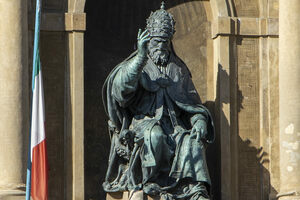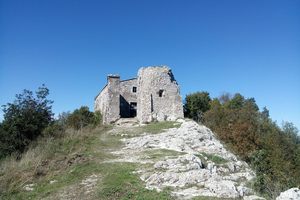Statue of Pope Gregory XIII in Bologna, Italy

Located on the central Piazza Maggiore, Palazzo d’Accursio serves as the town hall of the city of Bologna. On its façade, there is a large bronze statue located over the portal. This statue represents Pope Gregorius XIII, who was born in the Italian city and is most known for having commissioned the Gregorian Calendar.
The statue was installed in 1580 during the pontificate of Gregorius XIII and dominated the main square unchanged for two centuries. That is until the Napoleonic invasion of Italy ended the long rule of the Papal States over Bologna. Since the statue was seen as a symbol of the authority of the pope over the city, it was set to be melted into cannonballs, like so many other bronze artifacts of the era.
Before being destroyed, the statue was saved when the city council decided to turn Gregorius XIII into Saint Petronius, the patron saint of Bologna. After a few months of restoration works between 1796 and 1797, a miter and a crosier were added along with an inscription that reads, “Divus Petronius Protector et Pater” (“Saint Petronius Protector and Father”). The new disguise of the statue allowed it to be spared and it survived the Napoleonic Wars and the unification of Italy.
In 1895, the additions made a century earlier were removed and the statue was returned to its original appearance. The inscription dedicated to Saint Petronius remains to this day, leading some to think that the statue represents the patron saint of Bologna.





